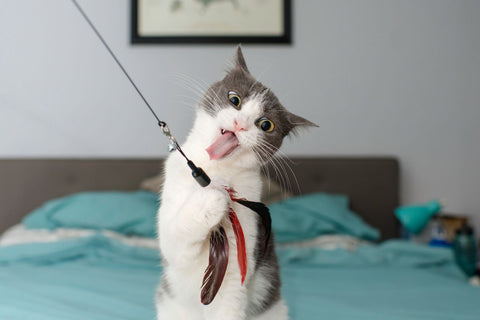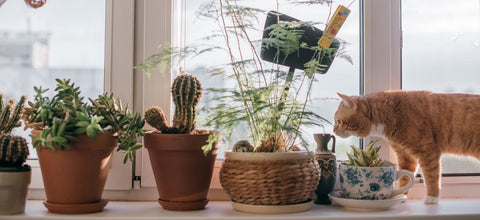

When you are a pet owner, it is essential to understand the signs of anxiety in cats so that you can help your pet overcome this problem. There are several cat stress symptoms that you should look for in order to understand why your beloved pet is having difficulties. Cat anxiety manifests in a variety of ways, so you should look for these signs.
Signs of Stress in Cats
Sign 1: Changes In Behavior
In many ways, cat stress symptoms are similar to what you will notice in a child who is experiencing anxiety. A cat that loved spending time next to you on a couch while you are watching television may hide underneath the bed in your bedroom. Your cat may also act out the way that a teenager does by making a lot of noise that causes problems for you and your neighbors. A cat might howl loudly at night, or it might meow incessantly.
Sign 2: Problems With Digestive Issues
When you are experiencing anxiety, you may have digestive issues, and your cat may have the same type of reaction. Signs of cat anxiety might include:
• A lack of appetite that leads to weight loss
• Vomiting that causes dehydration
• Defecating on the floor rather than in a litter box
• Urinating on your bed or couch
• Constipation that causes a bowel obstruction
If your cat has these symptoms, then it also possible that your pet has a serious health issue that requires treatment from a veterinarian. It is important to determine if your cat has a physical or mental condition that requires treatment.
Digestive issues in cats can be controlled with a supplement such as the Good Digestion Digestive Aid for Cats.

Sign 3: Excessive Grooming
Some cats will relieve anxiety with excessive grooming that can cause serious health problems. You may notice that your pet is licking its fur too much, leading to a loss of hair. In addition, the saliva from your cat's tongue can irritate its skin causing sores that won't heal. A cat may also bite its skin or fur, leading to deep scars in sensitive areas such as its feet or anal region.
Sign 4: Acting Depressed
Anxiety in cats may seem as if the animal is depressed rather than stressed. Your cat may not want to associate with you or other family members. If you have other pets, then a cat may stay away from these animals. Your pet may hide in different areas of your home so that it can sleep most of the time to avoid anything that makes it feel anxious.
Sources of Stress in Cats
Cats, much like humans, can experience stress due to a variety of factors. Understanding these can help ensure your feline friend maintains optimal mental health. Here are several common causes of stress in cats:
1. Changes in Environment
Cats thrive on routine and can become stressed by changes in their environment. This could include moving to a new house, changes in furniture placement, or even a new person or pet in the home.
2. Lack of Stimulation
Cats are naturally curious creatures. If they don't have enough mental or physical stimulation, such as toys to play with or a view of the outdoors, they may become stressed.
3. Multi-cat Households
While some cats enjoy the company of others, some cats may become stressed by other cats, especially if they are not introduced properly or if resources like food, water, or litter boxes are not adequately provided for each cat.
4. Health Issues
Illness or physical discomfort can cause stress in cats. If your cat's behavior changes significantly, it may be due to a health issue, and a vet visit is warranted.
5. Lack of Resources
Not having enough resources, like food, water, or litter boxes, can cause stress. A general guideline is to have one more litter box than the number of cats in the household.
6. Loud Noises
Sudden, loud noises like thunderstorms, fireworks, or loud music can stress cats. Some may also be bothered by regular household noises like vacuum cleaners or noisy appliances.
7. Traveling or Boarding
Cats are generally territorial and prefer to stay in their familiar environment. Traveling, whether it's a short trip to the vet or a longer trip, can be stressful. Boarding can also be a stressful experience due to the unfamiliar environment and absence of their owner.
8. Boredom
Cats need interaction and play to stay mentally stimulated. Boredom can lead to stress and may result in behavioral issues like overgrooming or inappropriate elimination.
Understanding your cat's unique needs and behaviors can go a long way in reducing stress and promoting their overall well-being.
How Can You Help a Reduce Cat Stress?
First, you need to have your cat examined by its veterinarian to make sure that it doesn't have a health problem that is causing the strange behaviors or physical symptoms. Next, determine if something has changed in your pet's environment that is leading to its stressed-out problems.
You can help your cat feel less anxious by giving it more attention each day with activities such as playing with toys or spending more time stroking its fur. You can always add a natural supplement to your cat's daily regiment.
One supplement that works extremely well is our CBD Oil for Cats. Prana Pets CBD Oil is organically grown and extracted in Colorado. Our bottles come with 350 MG of pharmaceutical grade CBD which has mild sedative effects. We recommend administering doses daily or larger does prior to activities that particularly stressful.





